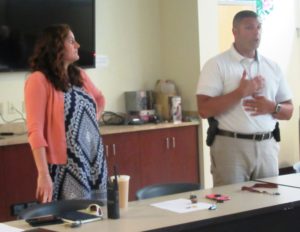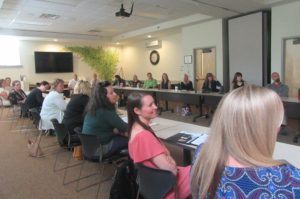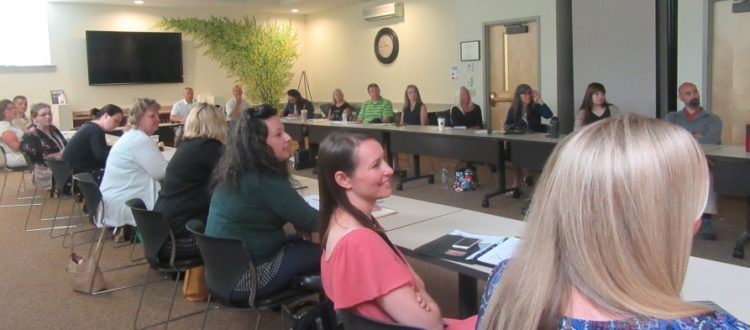LRCS and Laconia PD rolling out “ACERT” program
Early Intervention Tool to Help Children Experiencing a Traumatic Event

Erin Pettengill of the Family Resource Center and Officer Eric Adams of the Laconia Police Department, presenting ACERT update to community collaborators at LRCS in Laconia
Until now, police responding to incident calls like a domestic violence situation or drug overdose, have had few, if any, options to help children present in such situations. Increasingly, research provides compelling evidence—suggesting urgent action needed—that such traumatic experiences for children can have significant long-term negative impacts.
The science of brain development shows that the stress children experience in such situations becomes literally toxic to healthy brain development. Moreover, children experiencing such trauma are vastly more likely to model similar behavior, to themselves become abusive, use drugs, and in a range of other ways, become significantly less healthy over time. Research even shows a strong link to a broad range of physical health effects, including cancer and heart conditions. And those are just the physical manifestations; the mental and emotional scars for children can be even more devastating.
But now there’s more help. Modeling its new program on the nation-leading innovative work of the Manchester, NH Police Department, LRCS’ Family Resource Center, along with the Laconia Police Department, announced the rollout of a program designed to help children who experience some kind of traumatic event: ACERT, which stands for Adverse Childhood Experiences Response Team, offers a new way for local police and other first-responders to ensure that affected children are appropriately cared for and supported in dealing with both the immediate-term fallout from whatever the incident was, as well as the often-underlying and related longer-term issues. With opioid incidents, for example, it offers a way for parents to enable immediate and ongoing outside support for their children.
Erin Pettengill, Vice President of the Family Resource Center, explains “Early intervention is absolutely vital to ensure children’s physical, emotional, and mental wellbeing. We’ll now have a comprehensive and coordinated system of supports focused specifically on affected children, which is key to stemming the residual impacts from traumatic events that children experience.”

Representatives of region-wide agencies participating in ACERT program roll-out meeting at LRCS’ Main Office in Laconia.
The Laconia School District is also working closely with the Family Resource Center and the Laconia PD in coordinating the program. Virtually all of the relevant area social service agencies and other related programs for children will be additional referral collaborators to ensure the most comprehensive and timely intervention for children. The Family Resource Center will coordinate not just the immediate response and intervention, but also ongoing support as needed, to best ensure children’s wellbeing. The Family Resource Center has hired a full-time program coordinator, Kerri Lowe, to lead and manage the program.
Since the kickoff in September, ACERT has made a major impact in the city of Laconia. LRCS’ Family Resource Center, the Laconia Police Department, and the Laconia School District designed ACERT (Adverse Childhood Experiences Response Team), which offers a new way to help children who experience a traumatic event. This program makes sure children impacted by trauma are appropriately cared for and supported in dealing with both the immediate fallout from the traumatic event, as well as the often-underlying and related longer-term issues.
The ACERT team has been able to support and serve 22 children and 9 families within the city in just five short months. “One of the greatest accomplishments of the program has been the ability to connect families directly to the services they need,” said ACERT Coordinator Kerri Lowe. “Community partners have been great about making sure that children that have experienced trauma are promptly connected to resources to address their needs and ensure they have the opportunity for safe social connections.”

